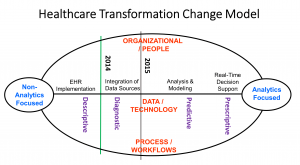2016 State of Population Health Analytics Report
Executive Summary
 Since 2014, the Healthcare Center of Excellence (HCOE) has been tracking the healthcare industry’s progress towards population health analytics using their proprietary Healthcare Transformation Change Model. This model was developed in 2013 to help healthcare organizations understand the requirements to become an analytics focused healthcare organization. The concepts were based on a customer relationship marketing (CRM) implementation model, previously co-developed by Professor Bennett. The CRM model was considered by Gartner to be one of the top three CRM implementation visions at the time and has become the basis for most successful CRM implementations today.
Since 2014, the Healthcare Center of Excellence (HCOE) has been tracking the healthcare industry’s progress towards population health analytics using their proprietary Healthcare Transformation Change Model. This model was developed in 2013 to help healthcare organizations understand the requirements to become an analytics focused healthcare organization. The concepts were based on a customer relationship marketing (CRM) implementation model, previously co-developed by Professor Bennett. The CRM model was considered by Gartner to be one of the top three CRM implementation visions at the time and has become the basis for most successful CRM implementations today.
The 2016 State of Population Health Analytics (SOPHA) study revealed that the overall healthcare industry is making progress but at a slower pace than expected. This is due to the challenge of integrating multiple sources and types of data and a focus on the data and technology to the detriment of people, processes and leadership. Larger healthcare organizations are making more progress than smaller ones due to their greater access to resources.
Methodology
Each year, the SOPHA study is conducted using a combination of primary and secondary research. This research includes:
- Interviews with healthcare executives
- Conversations with healthcare conference attendees
- Presentations from healthcare conference presenters
- News and journal articles
In 2016, the study was enhanced by utilizing a 20-question survey to add more empirical insights to the study. Once analyzed, the results were then validated through conversations with several healthcare executives.
The SOPHA study is based on the proprietary Healthcare Analytics Transformation Model developed by the HCOE which is comprised of 3 continuums – Organizational/ People, Data/ Technology and Process/Workflows. To be successful an organization must move along all 3 continuums at the same pace to progress from Non-Analytics Focused to become Analytics Focused, by completing the various steps at each stage of the transformation.
By applying the different types of analytics to the model, an organization can determine what steps must be taken and at what stage they will be able to perform specific types of analytics.
- Descriptive analytics is just past the ‘EHR Implementation’ stage on the data/technology continuum. Most organizations can perform some type of descriptive analytics from their EHR systems. Answers to questions such as, “How many patients were diagnosed with X last year?” can easily be determined.
- Diagnostic analytics could be performed once the organization is beginning the data integration process. Questions such as, “Why did these patients develop X?” can be addressed at this stage.
- Predictive analytics requires the organization’s data to be fully integrated in order to obtain a complete view of the patient’s health management. Questions such as, “What can be done to prevent X?” can be answered at this stage.
- Prescriptive analytics will not only require fully integrated data, but also a robust analysis and modeling function. Additionally, for prescriptive analytics to be most effective in a healthcare organization, the results need to be delivered to the providers in real-time to help support their diagnosis and treatment plan. Questions such as, “What is the relationship between X and Y and how can X be minimized?” can be addressed at this stage. (Bennett, Competing on Healthcare Analytics: The Foundational Approach to Population Health Analytics, 2016)
Based on the model, the HCOE determined that in 2014, the industry was just past the “EHR Implementation” stage on the Data/Technology continuum. In 2015, the dial moved a bit further as many organizations began achieving success with integrating data sources.
The full report with the 2016 results can be downloaded from the Healthcare Center of Excellence website.
